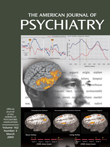Memantine and Catatonic Schizophrenia
Mr. A, a 56-year-old man with schizophrenia, was admitted after police discovered him wandering the streets responding to auditory hallucinations. His symptoms included mutism, staring, posturing, perseveration, stupor, and stereotypy (retrospectively assessed with the Bush Francis Catatonia Rating Scale, score=16) (2). His hospital course was prolonged because of partial response to olanzapine, haloperidol, ziprasidone, and risperidone. There were several psychotic relapses with polydipsia, staring, mutism, immobility, and somatic delusions. He was transferred several times between the acute care and extended care units.Memantine, 5 mg/day, was started, ziprasidone was discontinued, and clozapine was initiated. The next day, Mr. A’s symptoms improved greatly. He spoke more freely, and a feeling of his head being warm had subsided, as well as his preoccupation with drenching himself in baptismal fashion. His memantine and clozapine doses were titrated to 10 mg b.i.d. and 300 mg/day, respectively. His clozapine level was measured at 509 ng/ml.Uncertainty as to the efficacy of memantine promoted its discontinuation 9 days after initiation. Mr. A’s condition subsequently worsened, with a return of staring and soaking himself. Memantine was restarted, and his symptoms again significantly improved. Clozapine and memantine were continued, and his Bush Francis Catatonia Rating Scale score was 3, with automatic obedience.
References
Information & Authors
Information
Published In
History
Authors
Metrics & Citations
Metrics
Citations
Export Citations
If you have the appropriate software installed, you can download article citation data to the citation manager of your choice. Simply select your manager software from the list below and click Download.
For more information or tips please see 'Downloading to a citation manager' in the Help menu.
There are no citations for this item
View Options
View options
PDF/ePub
View PDF/ePubGet Access
Login options
Already a subscriber? Access your subscription through your login credentials or your institution for full access to this article.
Personal login Institutional Login Open Athens loginNot a subscriber?
PsychiatryOnline subscription options offer access to the DSM-5-TR® library, books, journals, CME, and patient resources. This all-in-one virtual library provides psychiatrists and mental health professionals with key resources for diagnosis, treatment, research, and professional development.
Need more help? PsychiatryOnline Customer Service may be reached by emailing [email protected] or by calling 800-368-5777 (in the U.S.) or 703-907-7322 (outside the U.S.).

